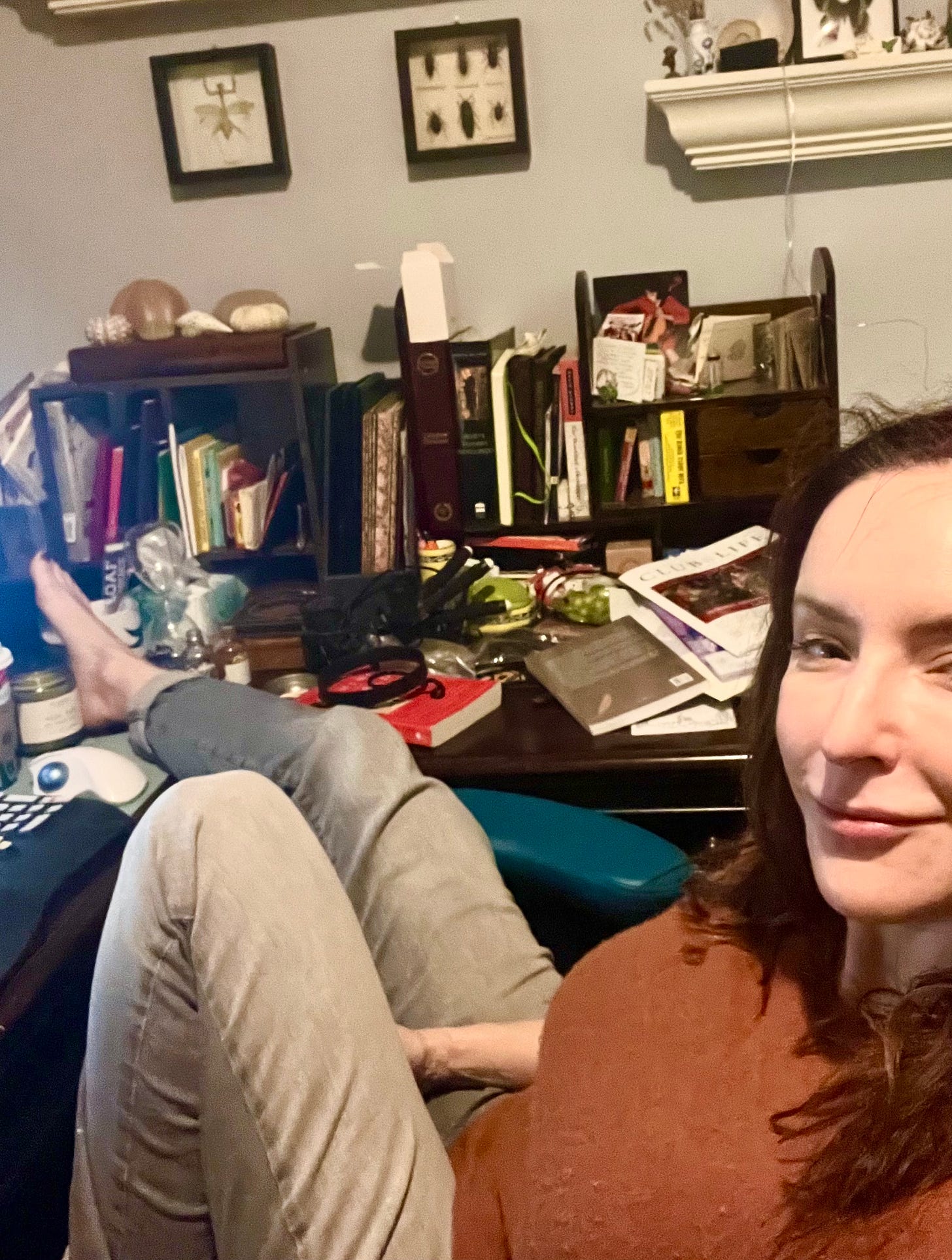Last week, I wrote about living and writing with ADHD; this week, as promised, I’m going to write about how I’ve managed to get five books done. What follows are the adaptations I made throughout my life (long before I was diagnosed) that have worked for me. Some of them might work for you, whether or not you have ADHD.
I’ll talk first about the adaptations I’ve made to allow myself to work—and second about tapping into the gifts of ADHD to make the writing itself better. In other words: How to work with it, and how to make it work for you.
Work With It
Embrace the wonky schedule
If you need a rigid schedule in order to work, good for you. But for me, there are days and times when I can get nothing done, and days when I can write 5,000 words. (For non-writers: that is a shitload of words.) If I expected myself to stick to a normal schedule, I’d sit there miserably a lot of the time and resent my project and get very little done, and then I’d convince myself I had writers block and give up. I work best when I take a week off and then write all Saturday afternoon, or when I haven’t written for a month and then write every day for a week. (But what if working on your own clock means you never get anything done? We’ll get to that.)
Embrace the sprint
Like many with ADHD, I work best under pressure and facing a deadline. Here’s a weird flex: In college, I put off a 12-page English paper until the night before it was due, then hammered it out between 9 pm and 2 am. A friend in the class kept telling me, kind of condescendingly, that I was nuts, and was then realllly put out when it won a departmental award. The point being not that this paper was easy for me, but that extreme stress and a tight deadline were my optimal working conditions. What I did was think about the paper for two weeks, then finish it the only way I could—in a flurry of stress and adrenaline.
I’ve learned to lean in to the sprint, not by putting off entire novels till they’re due, but in little ways. For instance: I’ll fail to plug in my computer, realize it’s running low on power, and then try to see how much I can write before it dies. (Fun!) One of the reasons I write well on an airplane is I know I only have so long before they say you have to put away your laptop. On a larger scale, you can make this work for you even when you aren’t under contract by finding real-world deadlines (contest entries, residency applications, fellowships, etc.) and putting them into your calendar. Or you can promise your friend or a writing group that you’ll have pages for them by a certain date. You have to really mean it, though. Like, schedule a dinner date to talk about the pages. Make a reservation and everything.
Or embrace the endless work session
I’m not alone in finding it impossible to concentrate when there’s some other commitment looming on the horizon. If it’s 11 am but I have to go to the doctor at 2, I’m going to be distracted until then. When my kids were little, it was hard to write during their naps knowing that at any moment they could wake up.
Writing at night works well for me, with nothing to stop me but my own fatigue. (Plus, like most ADHDers, I’m a night owl.) Residencies where I got to do nothing but work for days on end were lifesavers when my kids were younger. I have friends who’ve checked themselves into a hotel for a weekend to write—not only for the time and space, but for the promise of no interruptions.
Work on the move
I do think one of the reasons I work well on planes (and trains) is the movement. I also work well when I’m walking or biking. (I’m not carrying my laptop around in those situations, of course, but I do a lot of thinking about my book, which is absolutely work.) I’ve tried a bike desk, which works somewhat, but not as well, which leads me to believe the key is movement, not exercise. Do with that what you will.
But also, get exercise first
It sure is a hell of a lot easier to sit at your laptop when you’ve already sweated it out on the elliptical or done an hour of yoga.
Go for sensory overwhelm
For me, this it isn’t as much about shutting out sensory distractions as it is about letting my work overwhelm me sensorially. Specifically: A big external computer monitor, in a darkened room, with noise-cancelling headphones playing either white noise or music with no lyrics (or lyrics in another language). But this is part of why the airplane works so well, too: a darkened cabin, headphones on, literally strapped into my seat.
Or, write in the midst of chaos
For some reason, I also do well when everything around me is busy enough that it all just becomes a dull roar that I can tune out. The noisy coffee shop is perfect; just enough of my brain is occupied with tuning out the noise that the rest of my brain can focus.
Work with a partner
Having someone else there for energy, accountability, and camaraderie can help a lot. The classic write-in with a crowd doesn’t work for me—too many people to observe—but a writing date with one friend, either in a coffee shop or on Zoom, works wonders. You say “Let’s do a 20-minute sprint and then take a break,” but you often both end up going more than 20 minutes. Then you gossip and get more coffee, then you write more. Another reason residencies work well for me is that I know everyone in the adjoining rooms is also at work, and we’ll all talk about it at dinner.
Keep all your work for a project in one place
If parts of your novel are in different notebooks, some of those notebooks will get lost. If it’s in seven different files, you know you’ll never find all those files again. I work in one giant Word document, with a few ancillary files for research and timelines. If your brain can handle different files for different chapters, God bless. I’ll be over here writing entire novels in one document, and when I need to find a certain place I’ll go Wait, I know the word “margarine” was in that section and then I’ll do a search and find it.
Make a giant to-do list, rather than carrying a mental load
I’m not saying you need to be super organized. But if you’re writing something book-length, you just need one document—or even the first page of your manuscript—devoted to a running, chaotic list of the things you might want to do to your book. Otherwise, you know exactly what will happen. You’ll be reading over yesterday’s work and notice that you forgot to mention the parrot; then you’ll go to put the parrot in and realize you used the word “crackle” too much; then you’re doing a Control+F on “crackle” and start to wonder if maybe the whole book should start on page 5, and then… now you’re overwhelmed and your brain looks a lot like your browser, with fifty-eight tabs open and about to melt down. Instead, just write it all down. Write “parrot” and “crackle” and “start on 5?” and come back to it all later.
Don’t worry about organizing the list or prioritizing the items, unless you get into one of those nice little organizational fits. Just let it be.
A bonus: When you sit down and aren’t quite up to the task of facing your entire manuscript, you can look at your list and go “Oh right, crackle,” and then you’re off on a little three-minute task that will get you into the rest of the book.
Plan your distractions
If I don’t have app blockers on, I have a terrible habit of fleeing my document right when things get tough (which, if I stick it out, is also often a sign that things are getting interesting) and heading straight to social media or Wikipedia. Then half an hour later I’m foaming at the mouth about Ron DeSantis and my project is back there in the dust. I do much better when I think ahead about what my breaks and distractions will be. These could be food, or walking the dog, or researching something book-related, or exercise, or even something pleasant online. This is where my Zillow habit comes from. Relatively brainless movement of some kind is my best break, though, because I don’t actually stop working, I just end up thinking on the move.
Use writing as the procrastination
Take a look at the list of unpleasant or impossible tasks you’ve been putting off forever. Think about doing the hardest one. Let yourself work on your novel instead. Isn’t that so much better??
Sit weird
Something I didn’t write about last week: Like a lot of ADHDers, I prefer to have my legs hooked on something and my hands engaged or pinned down (like, I’ll sit on them). I can’t sleep unless my hands are pinioned under me or under my pillow. I need to have either one leg bent or one arm elevated in order to be comfortable. I'm probably painting a very strange mental picture; put simply, I don’t do well sitting normally in a normal chair. Maybe you don’t, either.
Let yourself work in weird positions, and in weird places. Work in bed (if you won’t get sleepy), or on the couch. Get a desk chair that allows you to sit cross-legged. Don’t force yourself to sit uncomfortably and then expect yourself to produce good work. Apologize to your chiropractor later.

Vitamin B (really), meds, caffeine
Except that here’s my problem: I cannot have caffeine. I used to use it, way too much, for focus, and it started to give me an irregular heartbeat, and now the most I can tolerate is a little bit of dark chocolate. My Focalin prescription helps a lot (I just feel like my sharpest self, not like someone else), and a really good vitamin B complex or (better) a regular vitamin B shot is also a miracle.
Call your own bullshit
Most of this is about knowing, and owning, how your own brain works. If “working on your own schedule” means you don’t write for two years, that’s not great. If “working under stress” means you’re constantly missing real deadlines, that’s not great. When you let go of societal expectations for how your mind should work, you’re free to observe and acknowledge how your mind actually works. It’s really valuable information.
Make It Work For You
Use your boredom detector
There are writers out there who assume every reader will have infinite, immaculate patience, that readers will gladly sit through fifteen pages of dreamscape with nothing happening. You know better. If you have ADHD, you have the world’s best built-in boredom detector. You know exactly when you might lose a reader’s attention. Use the force.
Embrace maximalism
I don’t mean that you should write an everything-but-the-kitchen-sink book. But: When you’re disengaged from your work-in-progress, think about what you are currently obsessed with, and see if there’s room for it in your project. After all, maybe your novel needed a paleontologist and a broccoli farm and a promiscuous opera singer! A lot of books run out of steam by doing too little. When you’ve done too much, you’ll know, and then you’ll take out the boring stuff. When you put in your current obsessions, you inject new life into the book, you take things in unexpected directions, and you renew your own interest.
(A note here, though, that I’m mostly talking about plot elements, not about layers of narrative complication (e.g., adding fifteen more points of view). In general you want to life more difficult for your characters, not for yourself and your readers.)
Use the next book as bait
There’s an ADHD tendency to always want to move on to the next, shiny thing. If you can’t shoehorn your new love into your old one (see above), there’s absolutely no harm in planning out your next project. BUT! Unless it’s truly time to abandon the current book, or unless we’re talking about taking a hiatus from a novel to write a short story, you should probably resist the urge to start a new book just because the old one got a little difficult and boring and the new one looks so shiny and fun. It’s an endless cycle.
Instead, let yourself dream about the new book, and take notes about it, but don’t let yourself start writing it yet. Use that book’s appeal as your reward for finishing the current project. Right now I’m absolutely salivating over the novel I’ll write when my current one is done (in two to fifteen years, oof). But rather than seeing it as a juicy alternative to my sad, boring reality, I see it as the reason to hunker down and hammer out two more pages of that sad, boring reality (that used to be, itself, the shiny new thing).
Lean in to the many things that constitute work
The people who sit there every day rigorously pounding out 500 words no matter what are actually at a disadvantage. They’re writing great stuff, but sooner or later they realize they’ve neglected to stop and take stock along the way. They haven’t brainstormed, they haven’t outlined in various idiosyncratic ways, they haven’t rebuilt their foundations, they haven’t researched, they haven’t made maps and calendars, they haven’t questioned everything and started over from a different point of view. They haven’t let the project lie fallow for a week and come back to it with renewed and changed energy. They’ve just plowed ahead diligently, perhaps in an unhelpful direction, as if they’re doing the homework that they probably always got A’s on for following the assignment and turning it in on time. It’s not that they can’t fix things; but sooner or later they have to stop and realize that slow and steady doesn’t always win the race. They need to undo a lot of their work—something they might not be terribly comfortable with. You know who’s comfortable with that? You. Me. Other people who haven’t been rewarded throughout life for thinking and working in a linear fashion.
Multitask to think about craft
If, like me, you are the kind of person who cannot just watch a movie, and must also simultaneously sew, eat, exercise, and Google the careers and personal lives of every actor involved in the film, you can put your multitasking to good use. Think about scene structure, think about arc, think about point of view and pacing and momentum and stakes.
And multitask to think about your own book. When you’re taking a shower and it’s too boring just to take a shower, skip the podcast and set yourself the task of thinking through a troubling scene or a vague theme. When you’re trapped at a boring work function, try living it through the eyes of one of your characters.
Enjoy the spoils of an associative mind
ADHD brains are ones that make rapid connections between disparate things. I have an analogy or five for everything, I can generate random ideas and details all day, and every story reminds me of seventeen other stories. I’m absolutely baffled by (though not judgmental of) people who say they want to write but don’t know what to write about. Like, do you not have several ideas for new novels before breakfast??
If your brain works similarly, this is a pretty fantastic tradeoff for not being able to control your attention. Would you rather be great at metaphors, or at putting away the dishes?
That’s what I’ve got…
But I’d LOVE to know what adaptations you’ve found, or what aspects of neurodivergence you’ve managed to take advantage of in your own writing or other creative work. Please comment below if you’re a paid subscriber! Comment from atop a throne of unfolded laundry!





How many people are just now, after reading these two newsletters, realizing that they have ADHD? 🙋🏻♀️
Sorry about the tax forms .....